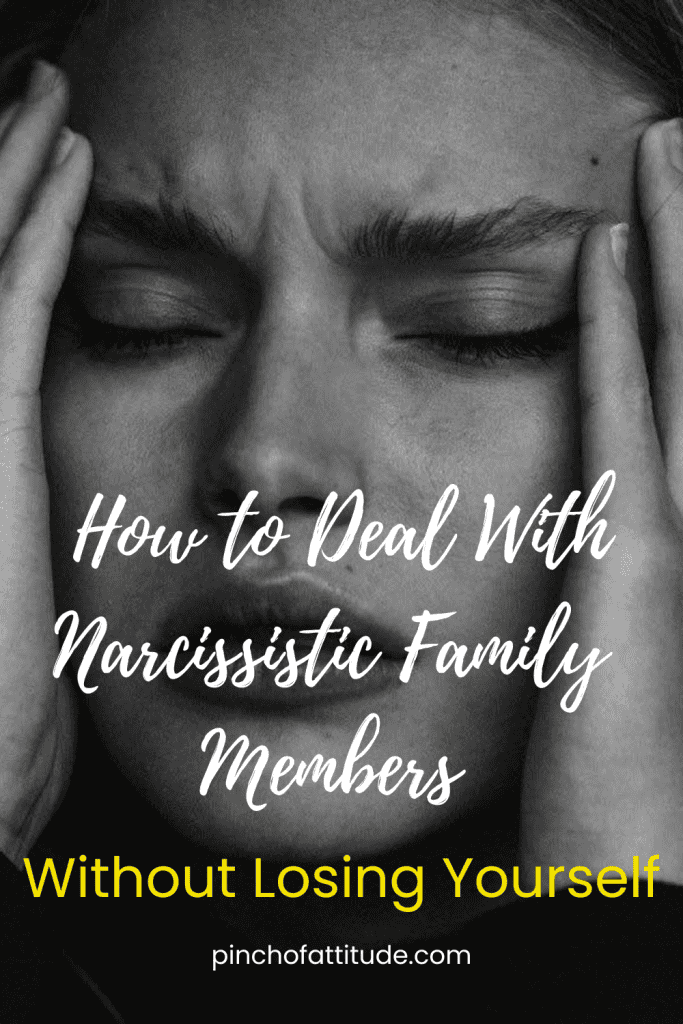My narcissistic family situation was like a rollercoaster, thrilling and terrifying, and all I remembered was just wanting to get the hell off the ride.
If you feel like you need to protect yourself from a narcissistic family system, then your feelings are valid. It’s okay to want to do this.
Your feelings are valid, and I can understand how you feel because I have been through the same experience.
I accepted my situation that I have a narcissistic family.
I thought to myself, I need to protect my peace of mind, and I don’t want to lose touch with who I am.
Though I can’t promise to have all the answers, I’m here to share simple and yet effective tricks that I found helpful to guard my heart and my soul from my narcissist family.
- The impact of your interactions with a narcissistic family member can and will influence your worth, self-image, and self-esteem if you’re not aware of it.
- Learning about narcissism and discovering your worth can help you avoid getting hurt by your narcissistic family.
- The ability to protect yourself is not a superpower that you gain overnight. It takes a lot of effort and practice but soon, you will get it.
Table of Contents
13 Ways How to Protect Yourself From Narcissistic Family Members

If you’ve ever experienced the manipulation and gaslighting of your narcissistic family members, it’s time to take back control of your life.
Below are my 13 ways you can apply to your situation to protect yourself from your family’s harmful behaviors.
1. Decide What You Are Not Willing to Tolerate
Taking charge of what you won’t stand for is key.
Narcissists often come off as vain.
My narcissistic mother would make me feel guilty just to satisfy her need to be the center of attention.
There came a time when I felt that I couldn’t handle the constant criticism anymore. I believe that you have the power to say, “No!”
You can make a list of things that drain your energy.
Take some time to reflect on what you’re no longer willing to tolerate, and consider practicing saying no in front of the mirror.
Remember, it’s okay to prioritize your own needs and say no when necessary.
I felt amazed at how empowering this simple act can be.
2. Limit Your Contact Whenever Possible
It’s important to consider limiting contact with a narcissistic family member because you deserve to prioritize your own well-being.
A narcissistic family member may leave trauma to you, especially with those little interactions.
When there is constant narcissistic manipulation around you, it can be difficult to maintain peace in your life.
I understand that you may be feeling down or discouraged right now.
You don’t need to completely cut ties with your abusive family members if you’re not ready.
However, it’s a good idea to slowly limit your interaction with them.
Sometimes it can be necessary to set boundaries and even screen calls.
I can assure you, it’s quintessential for you to protect your space.
Taking some time for yourself can be a positive step towards finding peace.

3. Keep Your Conversations Superficial With Them

When dealing with a narcissist in the family, you just want to avoid talking to them at all costs. Going to family gatherings was not a pleasant thing for me.
What helped me was to keep my conversations superficial and simple with narcissistic people in my family unit.
I mastered the art of small talk, and it’s like having a secret weapon.
It can be helpful to have a mental list of neutral topics to rely on in conversations.
So if a narcissist in the family is talking to me, I am ready with topics to talk to them about.
It can sometimes be challenging to have conversations that touch on personal matters.
Keep practicing how to steer conversations away from personal matters.
4. Build a Strong Network of People Who Can Help You
Imagine how incredible it would feel to have your very own personal cheer squad supporting you every step of the way. Of course, you can!
Having a support system helped reduce the chaos in my life.
I sought out support from my cousins and friends who understood the situation that I was in.
I reached out to them through a call or message, and they remained by my side, listening and giving me the comfort that I needed at the moment.
I want you to know that you are not burdening others with your presence or your needs.
In fact, by reaching out and allowing others to be there for you, you are giving them an opportunity to show their care and support.
5. Focus on Your Mental and Emotional Well-Being
Take the time to care for yourself.
Often, you can’t change the narcissist so it’s up to you to protect your mental health and wellness.
Meditation apps and gratitude journals can be wonderful companions to help support you in this journey.
Your mental and emotional well-being are important to you, and it’s completely valid to prioritize them.
In my personal experience, taking a moment to breathe had such a positive impact on my mental well-being.
Remember, taking care of your mental and emotional health requires a daily commitment.

6. Maintain a Calm and Neutral Demeanor in Their Presence
It’s true, this tip is easier said than done.
How can you stay composed during family events in front of your family, who treats you unfairly?
If you have family members with narcissistic traits and a lack of empathy, then you might feel mistreated, hurt, and angry.
This situation makes it harder for you to control your emotions, especially if you wear your emotions on your sleeve like me.
But it’s important to have control over when and where you choose to express them.
Deep breathing exercises can help you in managing stress and anxiety. It would help if you practiced how to respond rather than how to react.
Your calm demeanor will become your best defense to help you deal with possible manipulation tactics.

7. Learn More About Narcissism to Understand Their Behavior
Have you ever found yourself wishing that you had the superpower to decode your narcissistic family?
You might be wondering, “Why do they treat me like that even though they are my family?”
All my life, I wanted to learn about narcissism and uncover its mysteries, like solving a puzzle.
Turning on a light in a dark room can bring you a sense of clarity and understanding.
You can consider reading books, listening to podcasts, and attending workshops. Watch out for signs of narcissistic parents or siblings.
Once you gain a full understanding of narcissism, it will help you gain new perspectives.
These will give you armor to manage your unhealthy relationships.
You’re not just learning. You’re reclaiming control.
8. Use “Gray Rock” Method
According to the Gray Rock method, if you do not react to someone who is emotionally abusive or narcissistic, they will not gain the satisfaction or thrill. So, they will stop abusing you, making it an effective tool to protect yourself from your narcissistic family.
You can consider doing the following:
- Keep the conversation short.
- Avoid sharing personal information.
- Try to deflect attention away from yourself.
- Do not get into fights no matter what the other person says or does to start one.
- Do not show any emotion or weakness
- Avoid contact as much as possible, like by not answering texts or calls for long periods of time.
The goal is to lessen drama and conflict while protecting your own emotional well-being.

9. Keep Your Distance Emotionally
You should protect yourself from becoming too invested or feeling overwhelmed by your family’s behavior because you might end up getting hurt.
There are times when my mother will belittle me and point out every single mistake I made.
I know what she’s saying is not true, and it’s just her narcissistic personality disorder acting up.
But still, it left me thinking if I wasn’t good enough.
You should distance yourself from them and limit your interactions.
Sometimes you just have to accept that you are no longer connected as a family.
Instead of thinking that you are building walls, you are actually creating healthy boundaries.
And hey, it’s totally okay to prioritize your own well-being.
10. Document Your Interactions With Them

When I started documenting my interactions with my family, it helped me keep track of important information, and I always had a clear record of our conversations.
I used a simple note-taking app for quick reflections, and I wrote down the phrases that my narcissistic sibling and mother would use to gaslight me.
Now, wiser than ever, I can avoid being the victim.
It is an effective method to record your feelings and patterns.
It can be challenging to navigate through life’s uncertainties, so finding clarity can help you work towards peace and happiness.
It may feel like you’re dwelling in negativity, but remember that you’re actually gaining wisdom through your experiences.
11. Be Assertive, Not Aggressive When Communicating With Them
Narcissists tend to have strong feelings of entitlement.
They become obsessed with proving that they are always right, often at the expense of others.
Assertive communication can be a powerful tool for cutting through the noise and making your voice heard.
Try to be gentle and have a calming conversation rather than an intense, overwhelming one.
Another approach that was helpful to me is using “I” statements to express my feelings in a clear, helpful, and strong way. For example, “I feel…” or “I get nervous when…”
It means you’re not trying to start a fight and you’re simply expressing your perspective.
Learning assertive phrases can help you survive difficult situations where you need to express your needs and boundaries effectively.
12. Seek Therapy or Counseling for Coping Strategies
It’s comforting to have a steady hand guiding you along the way and offering you the best course of action.
Therapy can provide you with support and stability.
You can look for mental health professionals by researching thoroughly.
I dedicated one whole week of research until I found someone whom I could trust with my problems.
Seeking therapy means you are actively searching for strength, and you are committed to ending your toxic relationship with a narcissistic relative.
And that means one thing: you are not weak; rather, you are strong!

13. Have a Plan for Leaving the Situation if Things Get Worse
If push comes to shove, it’s important to have a plan in place for leaving the narcissistic family system.
You need to prepare carefully because you can not simply go back to your family if your plan fails.
Make sure to include a financial plan on how you will support yourself. You need to be able to buy basic needs like food, water, shelter, and electricity.
Planning will take time and it’s okay. You don’t need to rush it.
Leaving the family system in adulthood is probably going to be the biggest decision in your life.
Having an exit plan is like wearing a parachute so you are always ready to jump if needed.
It feels so comforting to have a safety net, knowing that you have different options available to you.
How Does Narcissism Run in Families?

Narcissism is like an unseen thread weaving through family dynamics. It’s not something that comes with a neon sign.
It sneaks into conversations, lingers in expectations, and sometimes it’s as quiet as a hushed whisper in a crowded room.
Narcissism in families can happen through both genetic and environmental factors.
Genetically, there is evidence to suggest that narcissism has a hereditary component, meaning that it can be passed down through genes.
Environmental factors within the family can also contribute to the development of narcissistic traits.
Children learn behaviors and attitudes from their parents, and if a parent exhibits narcissistic tendencies, the child may internalize these traits.
For example, if a child grows up in a family where their emotional needs are not met, they may develop a lack of empathy, another characteristic of narcissism.

There are other factors contributing to the development of narcissism, and each individual’s experience is unique.
What to Expect When You Protect Yourself From Them?

What you’re doing is not a simple task.
It’s such a courageous choice because as you start setting those boundaries, there might be some ripples.
You could face resistance, pushback, or even attempts to guilt-trip you back into the narcissistic family system.
Be prepared but also embrace the opportunity to discover your own strength and resilience.
But in the midst of this, you’ll also discover resilience you never knew you had.
Expect challenges, but also anticipate growth, self-discovery, and the kind of freedom that only comes when you decide to put yourself first.
Stay firm in your decision in coping with a narcissistic family, particularly, how you can protect yourself from them.
Related Posts:
- What Happens When You Ignore a Narcissistic Family Member? It Gets Ugly!
- How to Set Boundaries With a Narcissistic Family? 15 Ways I Used That Work
- How I Turned The Table on Narcissists in My Family Stress-Free!
- How to Escape a Narcissistic Family? My Guide to Your Safety
- What Happens When You Go No Contact With a Narcissistic Family? I Was in Heaven!
Frequently Asked Questions
How do you stay away from a narcissistic family member?
To stay away from a narcissistic family member, set clear boundaries and limit your contact whenever possible, prioritizing your well-being.
How do you respond to a narcissistic family member?
Respond to a narcissistic family member by maintaining a calm demeanor, practicing assertive communication, and steering conversations towards superficial topics to protect your peace of mind.
How do you not let a narcissist get to you?
Don’t let a narcissist get to you by focusing on your mental and emotional well-being, building a strong support network, and utilizing coping strategies like mindfulness and daily affirmations.
What are the signs of a narcissistic family member?
Signs of a narcissistic family member include a constant need for admiration, lack of empathy, manipulative behavior, and a tendency to treat others unfairly.
How do you shut down a narcissist?
You can shut down a narcissist by using the “Gray Rock” method, keeping conversations emotionally neutral, and practicing assertive communication to assert your boundaries effectively.






